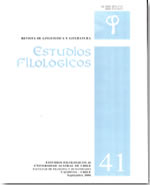The medical empathy voice and oral politeness strategies in a clinical interview
Main Article Content
Abstract
Within the theoretical framework of interactional sociolinguistics (Gumperz 1999), face theory and politeness theory (Goffman 1967 and Brown and Levinson 1987), this paper analyzes the positive and negative face politeness strategies used in the discourse of the medical interviewer's empathy voice, so as to preserve the patient's positive face and protect this interlocutor's negative face.
The results show that the medical role of achieving the patient's participation during the clinical interview is reached by applying positive and negative politeness strategies expressed by his emphathy voice. Positive politeness was marked by the control of turn taking, the use of the subjunctive mood, the imperfect past tense, address forms and modal adverbials and adjectives. Negative politeness was marked by the use of indirect speech acts, modal and performative marginal modal verbs as well as by modal adverbials and adjectives.

